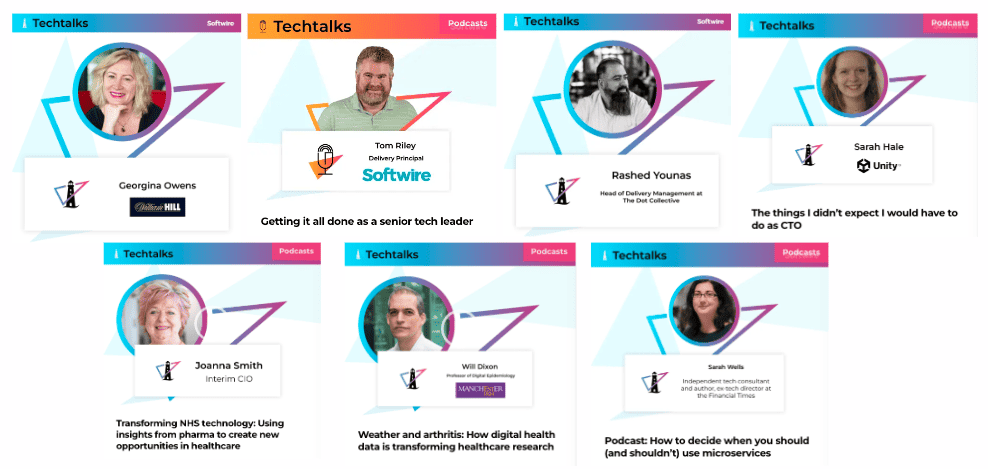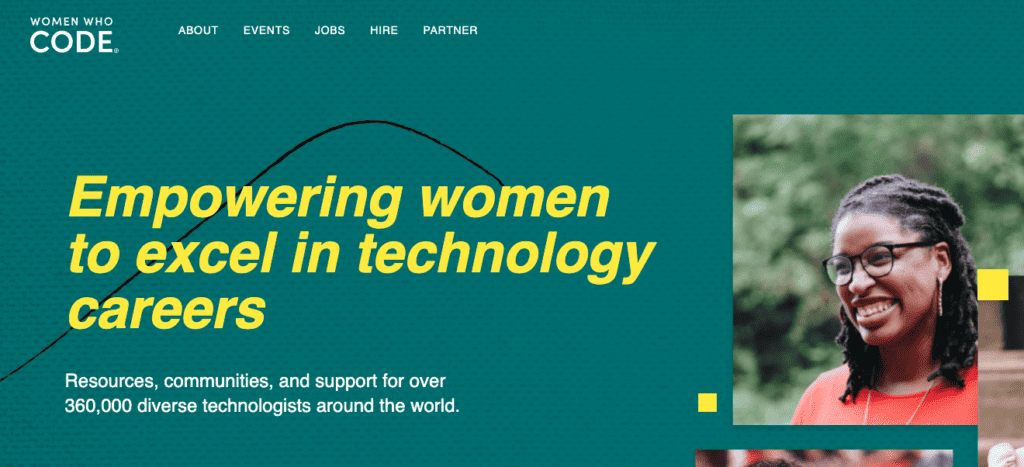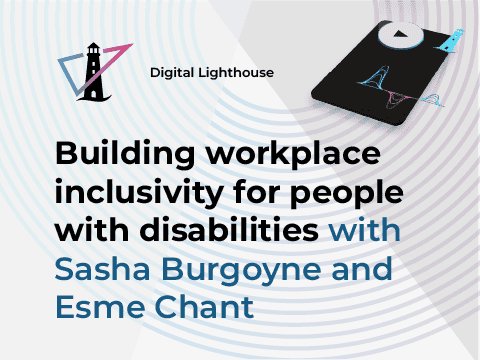“What it really means is that you’re looking at the intersection of seemingly unrelated ideas and how they fuel innovation. In very simplistic terms, by connecting diverse fields and looking at unique opportunities, you can solve complex problems” – Rajani Rao
In this special International Women’s Day episode of The Digital Lighthouse, we are thrilled to host Rajani Rao, a luminary in the tech industry and a staunch advocate for the role of women in technology.
As a principal technologist at Aveva and director of Women Who Code, Rajani shares her inspiring journey and the transformative work her organisation does to break barriers for women in tech. Through her story, we explore the importance of diversity for innovation, the power of challenging assumptions, and how Women Who Code is shaping the future of technology by empowering women with the skills and confidence to succeed.
Join us as we celebrate the achievements and contributions of women in technology, and shine a light on the path to a more inclusive and innovative future.
Listen to the podcast on this page, or wherever you get your podcasts, and read the transcript below.

Digital Lighthouse is our industry expert mini-series on Softwire Techtalks; bringing you industry insights, opinions and news impacting the tech industry, from the people working within it.
Listen to every Digital Lighthouse episode on SoundCloud
Transcript
Zoe Cunningham: Hello and welcome to the digital Lighthouse I’m Zoe Cunningham. On the digital lighthouse, we get inspiration from tech leaders to help us to shine a light through turbulent times. We believe that if you have a lighthouse, you can harness the power of the storm.
This week we’re very happy to welcome Rajani Rao to the podcast.
Hello Rajani
Rajani Rao: Hi Zoe.
Rajani is a principal technologist at Aveva, and she also is the director at Women Who Code, which is a global organisation dedicated to inspiring and enabling women in technology careers.
How’s everything going today?
Rajani Rao: It’s been good, so far, busy, but good!
Zoe Cunningham: That’s what we’re all aiming for, isn’t it? Well, let’s start a bit from the kind of perspective of your tech career. You’ve been at the forefront of digital transformation, you know, throughout your career and now as principal technologist at Aviva.
What innovative approaches do you believe are essential for technology leaders today, especially in terms of fostering environments that drive technological advancement? And also inclusivity?
Rajani: Thank you, Zoe. It’s a brilliant question. And my mission is to see women at the forefront of innovation. So there’s lots of study and research that talks about the influence of diversity on innovation, and technological advancement in that sense.
So I truly believe that bringing more women into technology, we bring more innovation into organisations.
For example, Boston Consulting Group Study showed like there was 19% more innovation, through diversity, and that’s just one of the stats – Innovation is essential. And with some core principles to guide it, we can enable this technological advancement.
So for me, the three favourite ones are challenging assumptions, connecting the dots and leveraging diverse perspectives.
Challenging assumptions. I love challenging assumptions, because there’s something inherent about questioning the status quo, and being a woman and having cultural and societal norms. I love challenging assumptions,
right? And you’re getting it almost for free, aren’t you? If you’re leveraging diverse perspectives, they are gonna challenge your assumptions.
Rajani: Exactly, exactly. So I love I love challenging assumptions. And then the second aspect to innovation and technological advancement is connecting the dots. And there have been various examples of how you can connect these dots.
And what it really means is that you’re looking at the intersection of seemingly unrelated ideas, and how they feel this innovation. I mean, I can go into, like the frameworks of innovation. But just in very simplistic terms, by connecting diverse fields, and looking at unique opportunities, you can solve complex problems.
My favourite one is a Japanese bullet train. They solved the sonic boom by looking at kingfishers. So they looked at how the Kingfishers dived into water, without a splash. I mean, I’ve watched this video, I was amazing how it can, not create ripples, and not splash, and it can catch the fish. So they took that inspiration and solved years of this problem, not knowing how to solve it, they look to nature to fix this.
And Netflix is another favourite example of mine, where they went from DVD rentals to a streaming platform and even creating their own content. And it highlights the success of integrating varied domains. If you look at the flip side, blockbuster, they were really doing good at the DVD rentals, but they went past because they just couldn’t connect the dots.
And last of all, is leveraging diverse perspectives.
There is so much study and research that talks about bringing these diverse viewpoints. And I know because I’ve been there, and I have patience in my name, and we have left lead the first of the current solutions. And I know none of this would have been possible without the diverse perspectives.

And here when I say diverse perspectives, it’s not just the gender gap, you’re talking age, are we talking ethnicity, we’re talking culture identity, neurodiversity, disability, and whatnot. It’s just just diverse.
So building teams, I’m a great believer of agile so building great high performing agile teams, you’re naturally bringing this whole concept of everyone having diverse perspectives. And being very agile, being very adaptable to everybody’s view in Agile has concepts such as disagree, and you have retrospectives where you can bring your perspectives and it’s really heard.
So one part of Agile is that and the other part is experimentation is like the core of agile. The “build, measure, learn” cycle, where we are looking at experimenting a little bit and seeing what’s the outcome.
So what do you want to learn? How do you want to measure it? And what do you want to build? And asking that question in that sense, helps you build things that you can learn from and helps you with this innovation cycle.
And you can do it within the team. Or you can have teams that actually look at it, innovation, and for me, it’s the hybrid that works. And totally, with this hybrid experimentation strategy, we can innovate and advance technologically. And as you can see, diversity with inclusivity. Baked in is an essential ingredient for innovation.
Zoe: I really appreciate the way you’ve laid it out there, because I think it really does show how integral diverse perspectives are, like you say all kinds of different forms of diversity. But even like connecting the dots, it’s obviously going to be easier to connect the dots when you have people with different perspectives who are looking at things in different ways.
Which brings us on really nicely to Women Who Code. What was it that inspired you to join Women Who Code and how, how has the organisation evolved to meet the changing landscape?
Rajani: I love this question as well. And it’s one of my favourite questions. It’s quite recent – I have two young girls, and it’s only very recently that I joined women who code – and it all started at the back of like two events happening.
So one is my four year old daughter, then she was in a football class. And during her break, she came running and she was very excited. But at the same time, a little bit puzzled. And she was like Mama, Mama, look, I’m the only girl here.
And that’s when I looked at it. And then something in me went “Ping!”, because I have most often been the only female in the engineering organisation. And I was like, Okay, I know this is coming. This is only the start she’s talking about in the football class, but it is going to come, she’s going to grow up.
And at that point, that’s the first time I thought, “Oh, God, we need to change this, we need to shift something, otherwise nothing’s going to happen.”
And the second incident that really game, I think, after a few weeks is I went to this school career fair, where I was enthusiastically showing off a cool robotic teaching aid to the kids, you know, as part of getting the A levels fand the GCSE girls and boys into engineering.
But what I found fascinating is only a handful of girls wanted to look at engineering as a profession. And most of them like gravitate towards being a teacher. And I had to deal with the teacher and said, ‘hey, send all the girls to the engineering table’. And she did. And while I was talking to these girls, most of them said, I don’t know. I don’t think I’m cut out for it. I don’t think I can do this. I don’t think it interests me.
And the more number of times I heard that, I really felt oh my god, I was really sad. And I was like this close to like, you know, feeling depressed.
So as I got back home, I spoke to my husband, I was like, You know what, I am so sad. I can’t believe that girls thing. They’re not cut out for it. And this is like I’m talking out of a school of like 150. I’m talking 10, 15 Girls turning up and out of which the rest – like 20 – who turned up, it just thought it wasn’t for them. So chatting with my husband, he mentioned about Women Who Code and that his friend is actually volunteering there. And I was when I looked at it, and I love what they do. And yeah, and I haven’t looked back since then.
Zoe: Fantastic.There’s that point, isn’t there, when it moves from something needs to be done to No, no, I need to do something. And I’m motivated, and I want to make this change happen.
Rajani: Absolutely. Absolutely. And then on to your next question of how Women Who Code basically at Women Who Code we listen very closely to our community of women, right?
So the offerings we have is mentorship, study groups, carrier development events, and etc, etc. You name it, we have it, right? And it’s all been at the request of what the community wants to see. Now, as a response to the feedback, we’ve expanded our focus to include cutting-edge technology topics like system design, machine learning, AI, and cloud technologies.
And of course, we know that this is all important. And if we want, like women to be in the forefront of these cutting-edge technologies, we want them to feel like they know something about it and they are able to contribute effectively in in the technology front. So we have revamped our mentorship programmes, we even introduced like writing and speaking clubs, because we all know the importance of speaking and having their voice. And they’ve been working even on the soft skills. And we partner with various organisations and we organise in-person events.
For example, we allow for free access to conferences, hackathons, and professional development opportunities. And I think of all the things, my favourite is the in person event, because the women who come there are there because they face all the challenges that women face in the tech industry. And when they see role models, when they see inspiring women, it just shifts for them. And you know, they go back feeling Yes, I can do this. And that is what I love. And so you and I met in one such event, and we all know the power of it.
Zoe: Yeah,absolutely. And it’s so big. And there’s so much to do and so much to be done, right? Could you maybe run me through some of you know, the most significant challenges that you’ve faced, you know, on your journey with Women Who Code and how you’ve overcome the challenges, and maybe also a success story as well, to kind of balance it out?
Rajani: Yeah. So I have working with Women Who Code seen firsthand how talented and ambitious women can be. And they are striving to make their mark in the tech world. And that’s good. But the issue is, if you’re a woman trying to break into tech for the first time, or you’re looking at career progression, there is that drive and potential in spades. But the biggest hurdle is how do we turn that potential into reality?
And that’s one of the biggest challenges we have. So on the flip side, we also have women who come, they want to take on tech roles, and they are ready, really ready, and we can see the potential. But if only they had some self-belief, and they have the courage to just say yes to some of the opportunities, I think that will bring transformation.
So what I would love to and one of the challenges we are currently looking at solving is how can we give internship and shadowing opportunities to such women, either the women who are looking to break into tech so they can get a taste of what it means and what is that that they are passionate about, right and which path they want to pursue. And also, for women who are already want to work on the next level, giving them opportunities to work at that next level.
So they have that confidence, and understand what are the day to day challenges. And proving it to themself and others like they have what it takes, will sort of help them get to the next level.
And the way we’re looking at overcoming this challenge is by building bridges, right? With organisations. So we work with organisations for internship and shadowing, it’s still a work in progress. But we would like to have more organisations come forth, and provide these doors and these opportunities, which is a bit of a challenge because, for example, one of the organisation I went to and spoke and they are huge and diversity, but they are also somewhat very careful about taking such initiatives.
So organisations have to tread carefully, you and me know that it’s probably some sort of education, it’s just educating them that, hey, you know, it’s not opportunities, just making it even. But there are challenges within organisations. And the second thing that we make it possible is by sharing success. So every time a woman takes on a challenge and succeeds,
I believe it’s a story worth telling. And these stories are what inspire other women to believe in themselves. And they also show that companies are real tangible benefits to diversity, like fresh ideas, new perspectives, work culture, that everyone wants to be part of. And they see role models, and it helps them get that confidence if like someone else has done it, and I can do it. And you know, taking it further down into like schools, like the kids seeing a role model successful in STEM for them, they know that they can have a fulfilling career in STEM and not think it’s not for them.
Zoe: Yeah,I think doing things through celebration, doing things through positivity, rather than negativity is so strong, to say, look, look what women can do. And if they can do it, you can do it. And that goes right the way down.
Rajani: And I spoke about challenges. And if I have to speak about the positive things! 80% of the community who belong to Women Who Code say that they have seen benefits being part of this organisation, which is great in terms of like personal growth, confidence and carrier growth.
But for me, personally, I think organisations such as Women Who Code can influence policy and practices and I have been part of a panel where it was the progressive policy institute, we were talking about policies of how we can have more women in tech, and as a mother of two girls, and most often being the only women in engineering.
I love that we were talking about how to drive changes in policies to increase the percent of women in tech. Like this is like we’re talking childcare shared parental leave policies, etc, etc. So, for me driving policies that are global, will create a huge impact.
The small organisations will drive the policy which will in turn have like a massive impact on the women everywhere, especially in tech. And for me, that’s like one of the biggest wins being part of that, and aiming or driving and influencing these policies and practices.
Zoe: Yeah, we all have a limit to the number of people we can personally mentor and personally help. So it’s great to be part of that wider change.
On that kind of note, what advice would you give to CTOs in large organisations to support and promote diversity within their tech teams? Because I know so many CTOs are trying so desperately to do this. And they almost don’t know where to start.
Rajani: It’s another fantastic question. And I being CTO at WinVest, I strive for this. So this is not just for CTOs. It can be any tech leaders trying to like support and promote diversity. And most often, we have the problem where, like, the deliverables take so much focus that we are like, oh, you know, what this needs get done. Let’s recruit quickly. And you have a small pool of women. So where do we get that? Women? Right? So if I were to like, talk about various aspects, like, like I said, for me, understanding your team is important.
So the psychological safety for women is super, super important. Are you creating a psychologically safe space for diverse perspectives? Right? Like, can they speak up? Are you ensuring everyone feel safe to speak up?
I mean, that’s the biggest thing for me, like, understand your team, have non managers, but leaders role model this at the top and can ensure that they do active listening, and listen, and make everyone feel psychologically safe to speak up.
And you can facilitate this through open conversations. You know, I’m a trained leaders who coach, and I know how I’ve had to shift my ways of communication. And it’s fantastic if you use the coaching approach versus the traditional method.
So having open conversations and just speak about the issues, I think is great. So foster that culture.
Flexible Working is another great point. And I’ve been there as a mom of two kids, and juggling, you know, life. We all know life doesn’t stop just for works and flexible hours remote working options, like having not even simple things like doing scheduled meetings during school runs. And I often find us women, we hesitate when we have to say, hey, you know what, that clashes with my school run, or I have to drop off my children in the morning.
In fact, when I join Aveva, the first thing I said is, hey, I can never make it to the standups in the morning by 10, can we move it to 9:15. And my manager was more than happy to move the Reschedule at 9:15. Because that gives me a chance to be there and be part of that meeting.
So things like that small things like that will really de stress and help women actually stay in their roles. And the other thing I would usually emphasise is to take a look at your shared parental leave and maternity compensation.
I was part of one of the organisations in the past where there was like predominantly men, and there was no shared parental leave, like good a pay package. And I can see why it wouldn’t be getting the benefit of the company.
But the more and more shared parental leave, you get like a good compensation, it means that women can come back into the workforce sooner because they can share their parents leave, right? Think about these things and look at the gender pay gap in your organisation.
And all of this really helps. And then again, I might come off as very strong when I say this, but I’d love to absolutely mandate the unconscious bias training or bias training in general conscious or unconscious, if I can, right from the school, right? I like school age is mandated. A
nd that’s one policy, I would push both at workplaces and in the school system, just make it mandatory because we all say things do things and we don’t even know that we are all engulfed in this unconscious bias. And there’s been a lot of research if you look up, and I find it so fascinating, and I have caught myself having unconscious bias. So just educate people on this and make it obvious to people that hey, you know, I am operating in my unconscious bias.
And you can talk about accountability for an organisation – just publish your figures on how much diversity you have. And that’s all sort of give you a motivation to resist the temptation of compromising on diversity when you’re under the pressure for delivery.
Zoe: Yeah, exactly. shine the light on it and make yourself accountable for it.
Rajani: And I think for me, the last one is leadership by example. You can’t just have like in pockets, people wanting this diversity and it’s not coming From the top, the leadership should like really feel and live and breathe diversity.
And I think if like say CTOs and business leaders, they all feel that they can inspire confidence in their teams, and believing in the value of diversity and inclusion, it trickles and it builds this culture. You know, once you’ve set the culture, then it’s in your culture. And everything just just works.
Zoe: Yeah, absolutely. And they all you can see how it all builds in these are all building blocks that you need. All of them in place, you need leadership by example. You need people to be aware of their unconscious bias. And you also need a safe space so that people can speak up when they see it.
Otherwise, you just haven’t got the tools in place to start to try and change things.
Just finally, looking ahead. How do you see the diversity landscape in tech evolving? And what role will Women Who Code play in shaping the future?
Rajani: So if you look at the current statistics, right, there are so many organisations which are released the statistics and you look at the statistics, it looks like doom and gloom. Because if you look at what it was in, like 2010, and what it is now in like 2024, there’s been like, steady, positive is a steady but a very slow progress.
And this progress is in terms of the number of women earning computer science degrees and the number of women in tech women in senior leadership, right. And I’ll be honest, if we didn’t do anything about this, and if he just let you know, the ‘slow and steady wins the race ‘will take us several decades to get there.
Zoe: Or longer right?
Rajani: Yeah, yeah, like decades. And organisations like Women Who Code and in, there’s Girls Who Code, any therapy. They’re all like really good at accelerating the timeline. And we all trying very hard. I mean, I’ve just named a few organisations, but there’s so many organisations out there, who are trying to accelerate this timeline and trying to support women through the tech journey, and then their career advancement, so they can break the glass ceiling.
So absolutely, these organisations bring in a change. And I think the three important aspects of how you can hasten. This is education and early engagement, right? Introduce girls to STEM fields early. And also make sure that this interest is sustained through high school and college.
Sometimes it’s the peers that basically, even if your child is interested in science, I have seen my child who was interested in dinosaurs, all of a sudden went to school and loves everything pink and purple. I’m not saying it’s anything wrong with it, but I can see the pure influence. So I don’t want women to say I’m not cut out for this just because their peers felt that they weren’t cared for it.
So it’s that, you know, like trying to get everyone to believe that yes, you know, it stems for me and having more number of kids in schools, high school and colleges, taking up STEM subjects. And then policy and organisational change, like I said, flexible working work life balance, parental leave.
And to be honest, like most of the women actually take most of the carers responsibility. And so I would like to really bring in the shift to like, look at this, and I believe equity starts at home. So look at your home, when you wake up is that parity at home, in our house, like me and my husband are very conscious, and I come from an Asian family. So we are trying to break and I’ve had to break the societal norms and in my thinking, to be where I am.
And we consciously try and swap our jobs. So I enjoy DIY anyway. So I do a lot of the DIY and the finance and stuff at home. My husband takes care of the cooking and laundry pickup and the school runs. And my girls were grew up thinking, hey, you know what, I don’t have to be the caregiver when I grow up, because my husband is fab at it, and he champions me.
So it’s also looking at your own homes and seeing what can you do that little small difference that can change the mindset of the girls when you know as they’re growing up?
And lastly, I think is the visibility and representation. So the more we highlight successful women in tech and increase their visibility, it will serve as an inspiration and a proof that like women belong in tech and all levels. Zoe highlighting role models like yourself, you know, will have such a profound impact, honestly.
Zoe: Well, same back to you, Rajani, and thank you so much for coming on the podcast and helping us to shine a light for others.
Rajani: Thank you. My pleasure.
If you’ve enjoyed this episode of the digital lighthouse, our team are available to help you unlock the potential of strategic innovation. Learn how clarity, accountability, and embracing both successes and failures can propel your organisation forward.


